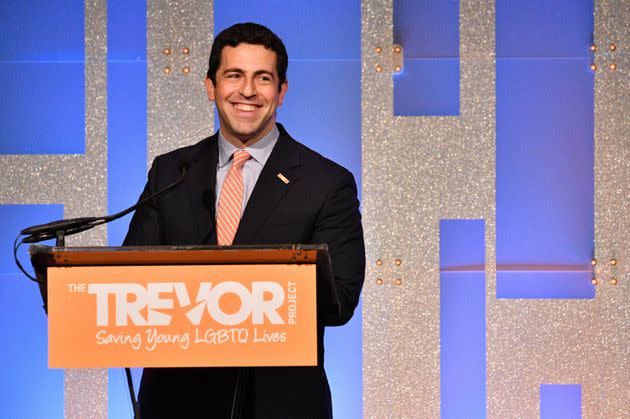Trevor Project Ousts CEO Who Played A Role In The Opioid Crisis

Amit Paley speaks onstage during a 2019 Trevor Project event in New York City. (Photo: Bryan Bedder via Getty Images)
Amit Paley, the embattled CEO of The Trevor Project, was removed from the helm of the LGBTQ suicide prevention organization this month by the group’s board of directors following widespread staff backlash against his leadership, the organization confirmed.
Paley’s ouster comes a few months after HuffPost revealed that Paley had worked with Purdue Pharma, the notorious OxyContin maker, while he was employed by the global consulting firm McKinsey & Company. His exit was first reported by Teen Vogue.
Around the time of HuffPost’s revelations, Trevor Project staff had been criticizing Paley’s vision for the organization, saying his focus on growth was compromising the quality of counseling that the organization offers to LGBTQ youth in crisis.
“Many members of our staff have raised concerns about workplace well-being, professional development, prioritization performance metrics, and resourcing compensation — particularly as they impact our BIPOC, transgender, nonbinary, and disabled team members,” The Trevor Project said in a statement to HuffPost. “While a comprehensive, independent review of The Trevor Project is being conducted, the Board of Directors elected to make a change in leadership.”
The Trevor Project has also engaged outside advisers to launch an investigation into staff complaints, according to a letter the current board chair, Julian Moore, sent to The Trevor Project staff. The letter, seen by HuffPost, did not specify the content of those complaints.
At the time of Paley’s work with Purdue Pharma — 2016 and 2017 — the opioid epidemic was claiming tens of thousands of lives every year, and Purdue Pharma’s reputation was in free fall. HuffPost discovered that Paley was part of a McKinsey team that helped Purdue build a 10-year strategic plan to boost the sales of opioids and other Purdue products.
Paley also helped McKinsey compete to handle data analysis for Purdue and compete for a separate project that involved resuscitating Purdue’s collapsing public reputation.
In 2017, Paley left McKinsey to lead The Trevor Project. His role on McKinsey’s Purdue account remained a secret until this summer, when McKinsey published more than a decade’s worth of documents from its work with Purdue as part of a $573 million settlement over McKinsey’s role in the opioid crisis.
“If I knew then what I know now, I would not have agreed to do any consulting for that company, and I regret that I did,” Paley said in a statement to HuffPost this summer. Gina Muñoz, the chair of the board, said the board had “full confidence in Amit as CEO of The Trevor Project and stands firmly behind him.”
But the details of Paley’s work for Purdue reportedly rocked The Trevor Project staff. The group’s own research has found a link between prescription drug abuse and an increase in suicide risk among LGBTQ youth. Teen Vogue reported that, in the wake of HuffPost’s story, many staffers believed Paley should resign.
Already, many staffers were distressed by Paley’s vision for The Trevor Project: a focus on rapidly scaling up its LGBTQ counseling services, which the staffers claimed was coming at the expense of quality.
In the lead up to Paley’s exit, more than 200 Trevor Project staffers signed a letter complaining about the breakneck growth.
Co-founder Peggy Rajski will reportedly serve as interim CEO, with assistance from Muñoz.
“It has been the honor of a lifetime to lead The Trevor Project’s life-saving team for over five years,” Paley said in a statement to HuffPost. He mentioned that during his time as CEO, the organization’s counseling services increased tenfold, became available 24/7, and expanded internationally for the first time.
“We grew our team from 50 employees to over 500. The Trevor Project’s vital work is needed now more than ever, and I will always remain deeply committed to the organization’s vision of a world where all LGBTQ young people see a bright future for themselves.”
This article originally appeared on HuffPost and has been updated.
